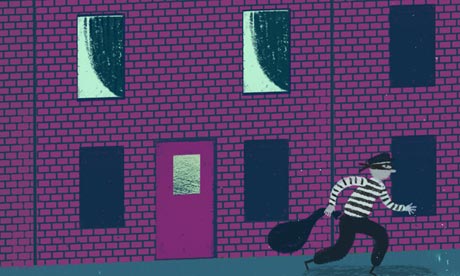
In June, an Ohio man named James Blankenship was arrested for breaking and entering into his mother's home in broad daylight. The cliched phrase "police surprised a burglar" seems especially appropriate here, since Blankenship, according to the Cleveland Scene newspaper, "told officers he didn't think he could be arrested for burglary because it was not night-time". Let's add Blankenship's name to the list of victims of the Dunning-Kruger effect, whereby some people are so untalented (at crime, in this case) they can't see how untalented they are. Yet his intuition that thievery and darkness are connected wasn't entirely buffoonish. The old English common-law definition of burglary did indeed specify "entering the house of another in the night". And if crime isn't technically less illegal in daylight, it's definitely less common on well-lit streets than dark ones: in her new book Sidetracked, about unlikely influences on behaviour, the Harvard business professor Francesca Gino cites evidence that improvements in street lighting can reduce crime by up to 70%.
The explanation is straightforward – darkness confers anonymity – but research by Gino and her colleagues shows that this anonymity works in intriguing ways. In one study, people had the opportunity to profit financially from lying about their success at certain problem-solving tasks; in a dimly lit room, around 60% proved dishonest, compared with 24% under bright lighting. They can't have been making rational calculations about the chances of getting rumbled: the tasks were equally anonymous for everyone. Instead, dim lighting seemed to trigger what Gino calls "illusory anonymity" – a feeling of inhibitions being loosened and self-consciousness being soothed. Even wearing dark glasses, she found, was associated with more selfish behaviour. This probably won't shock anyone who's dealt with web trolls or cyberbullies. The much-discussed "online disinhibition effect", which causes reasonable members of society to become monsters at their keyboards, doesn't occur only when they're untraceable. It results from a more nebulous feeling that the usual constraints don't apply.
"Inhibition" and "disinhibition" are troublesome terms, though. They paper over the fact that disinhibition can be a good thing: if feeling anonymous frees some people to be dishonest, it frees others to perform at their best. Recent German research reveals that people do significantly better at creative tasks in dimly lit rooms. There's a parallel here with the rough-draft stage of writing – crucial, as almost any writer will confirm, because it permits experimentation without feeling observed.
As the cyberbullying and rough-draft examples indicate, though, literal darkness is only one of many ways to trigger illusory anonymity. You've probably heard of "stereotype threat", which suggests that women perform worse at maths exams, say, because they're fearful of confirming the stereotype that women are bad at maths. Allow them to sit the exam using a pseudonym, and the effect vanishes, according to a paper in the journal Self And Identity. It doesn't matter whether the fake name is male or female: all that's needed, it seems, is relief from the sense of being watched or judged. Maybe we should also equip examination halls with dim bulbs. By which I'm not referring to James Blankenship.
oliver.burkeman@theguardian.com
• Follow Oliver on Twitter

